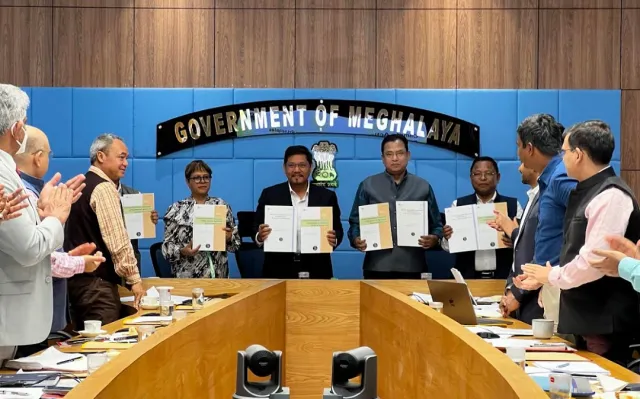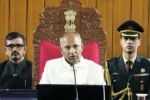HT Bureau
GUWAHATI, May 17: A meeting of the Meghalaya State Council on Climate Change and Sustainable Development has been held to focus on leveraging community institutions as part of a collaborative strategy for community-led climate action.
The meeting was held under the chairmanship of Meghalaya chief minister, Conrad K. Sangma at the secretariat building in Shillong on Thursday.
Despite abundant rainfall and lush green landscapes, the state stands at a critical juncture amidst climate change, where urgent and coordinated interventions are needed to ensure sustainable environmental management and resilience. In response to this, the Council unanimously agreed on the need for coordinated and targeted strategies towards climate action particularly on the rejuvenation of critical water sources, catchment area protection and massive afforestation.
With respect to the rejuvenation of critical water sources, the state public health engineering department has identified critical water sources in the state that require immediate rejuvenation to ensure source sustainability and supply of water. To bring about a collaborative response to this challenge, it was highlighted how the state is working on a GIS-based enabling technology platform to visualise various interventions for rejuvenation at the village level, emphasising that these will allow the state to develop plans to meet the need for water, especially during the dry seasons. To ensure multiple departments and agencies work collaboratively on this effort, the need for a multi-sectoral approach by leveraging existing departmental initiatives or programmess was highlighted to rejuvenate a targeted set of 100 critical sources on priority.
For catchment area protection, the Council discussed the need to have a regulatory framework through the Amendment of the existing Meghalaya Protection of Catchment Areas Act, 1990 to protect critical catchment areas from further degradation. In this regard, the Council emphasised the need for a consultative process in amending the Act with the community at the core, given that most of the forest land in Meghalaya belongs to individuals and communities. This approach aims to ensure that community participation remains central to decision-making processes regarding catchment area protection and fostering local ownership of the problem.
The Mawsynram Declaration of 2019 was highlighted as a case study of how communities led the effort towards catchment area protection, where 24 villages came together to declare their collective desire to take up conservation and sustainable livelihood opportunities.
Laying emphasis on an urgent need for Champions of Climate actions, it was highlighted that over the last five years through the World Bank-supported community led Landscape Management Project (CLLMP) project, over 13,000 village community facilitators have received training in various aspects of climate action.
Through a video, Conrad K Sangma highlighted the dire situation in West Khasi Hills district, with its barren landscape spanning across large areas of the district. This brought to light the dire need for mass afforestation across such barren patches in Meghalaya by introducing the Miyawaki model of afforestation programmes. He underscored the need to counsel community members, especially the village headmen on the benefits of Payment for Ecosystem Services (PES) and to prioritise the most vulnerable areas. Other initiatives that were shared included the use of Sloping Agricultural Land Technology (SALT) and aroma plants, which have a stronger capacity for water recharge.
The quick results and impact on forest cover achieved through the Miyawaki forest models for land rejuvenation was also highlighted by the state soil and water conservation department, stating that pilot projects on the Miyawaki method of afforestation conducted in West Garo Hills and West Khasi Hills districts between 2022 and 2023 are yielding promising results, with an 81 per cent survival rate of plant and tree species.
As a way forward, the meeting underscored the importance of departmental responsibility in aligning actions with the council’s objectives, as also highlighted by the chief secretary, Mr. DP Wahlang. It was decided that the council would proactively plan targets and programmes for the next quarter, facilitating comprehensive discussions and finalisation of the plan of action in subsequent meetings. Furthermore, collaboration with stakeholders and experts to enhance the council’s effectiveness in addressing complex climate challenges was also highlighted.












